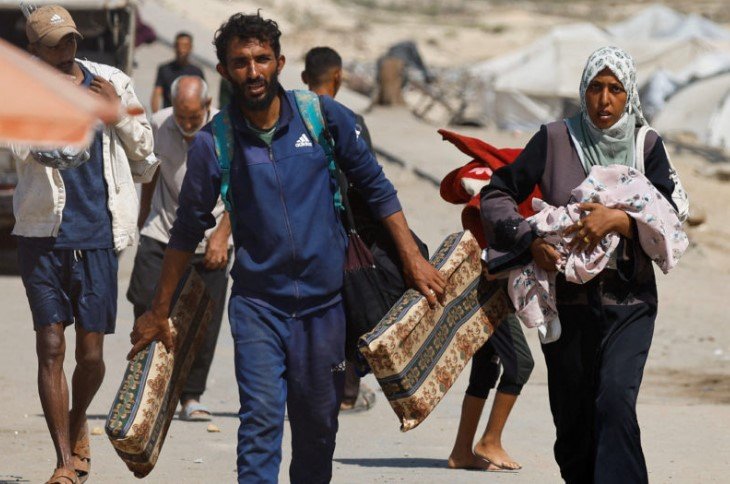US President Donald Trump urged all sides to act quickly on a Gaza ceasefire deal as negotiators from Israel, Hamas, and mediators gathered in Cairo on October 6, 2025. The talks focus on Trump’s 20-point plan, which aims to free hostages, end the war, and bring peace to the region amid rising tensions.
Key Players Head to Negotiations
Delegates from Israel and Hamas arrived in Cairo late Sunday to start indirect talks on the proposed deal. Israeli Strategic Affairs Minister Ron Dermer leads his team, while Hamas official Khalil al-Hayya heads the group’s delegation.
Trump’s plan calls for an immediate release of all remaining hostages in exchange for Palestinian prisoners. Sources indicate Hamas may demand the freedom of high-profile figures, which could complicate progress. Egyptian and Qatari mediators are working to bridge gaps between the parties.
The negotiations come two years after the October 7, 2023, attack that sparked the conflict. Families of hostages rallied in Tel Aviv over the weekend, pressing for a swift resolution.

Details of Trump’s Ambitious Plan
The 20-point proposal outlines a phased approach to peace. It starts with a ceasefire and hostage releases, followed by Israeli troop withdrawals from parts of Gaza.
Key elements include:
- Release of all hostages within 72 hours.
- Israel freeing 250 Palestinian prisoners serving life sentences and over 1,700 others detained since 2023.
- Disarmament of Hamas and a ban on its future governance in Gaza.
- International oversight for rebuilding efforts, funded by Arab and global donors.
Trump described the plan as a chance to end a long cycle of violence. He shared a map of withdrawal lines with both sides, emphasizing quick action to avoid delays.
Hamas has shown willingness to negotiate but insists on full Israeli withdrawal and specific prisoner swaps. Israeli Prime Minister Benjamin Netanyahu faces pressure from his coalition to avoid concessions that could weaken security.
Challenges and Potential Roadblocks
Netanyahu works to keep his right-wing allies supportive of the deal. Some coalition members worry it gives too much to Hamas, risking the government’s stability.
Hamas sources say they will not back down on demands for notorious prisoners, even if it risks the talks. This stance echoes past negotiations where similar issues stalled progress.
Recent events add urgency. Israel continued airstrikes in Gaza over the weekend, killing dozens, while Trump warned against delays. He sent advisors like Jared Kushner and Steve Witkoff to monitor the process.
A table below summarizes recent developments in the conflict:
| Date | Event | Impact |
|---|---|---|
| Oct 4, 2025 | Hamas agrees to talks | Opens door for negotiations |
| Oct 5, 2025 | Trump urges fast action | Increases pressure on parties |
| Oct 6, 2025 | Cairo meetings begin | Potential for first-phase deal |
These steps build on earlier efforts, like Qatar’s role in prior hostage releases.
Analysts note that external factors, such as Iran’s influence on Hamas, could sway outcomes. Trump’s team believes the plan aligns with broader Middle East peace goals, including potential Saudi involvement in normalization deals.
Global Reactions and Next Steps
World leaders have mixed views on the plan. The UN praised the push for talks, while some European nations called for stronger humanitarian aid provisions.
In the US, Trump highlighted positive weekend discussions with Arab leaders. He aims for a first-phase agreement this week, focusing on hostage releases and a temporary truce.
If successful, the deal could lead to Gaza’s reconstruction under a technocratic administration. However, failure might escalate fighting, with Israel vowing to continue operations against threats.
Experts predict tough bargaining ahead, but the involvement of experienced mediators offers hope.
What This Means for the Region
A ceasefire would ease suffering in Gaza, where over two years of war have displaced millions and caused widespread destruction. It could also stabilize Lebanon and other areas affected by related conflicts.
For Israel, securing hostages remains a top priority, with public support strong for any deal that brings them home. Trump’s direct involvement marks a shift from previous US approaches, emphasizing bold timelines.
Readers, share your thoughts on whether this plan can succeed. Comment below and spread the word to keep the conversation going.
